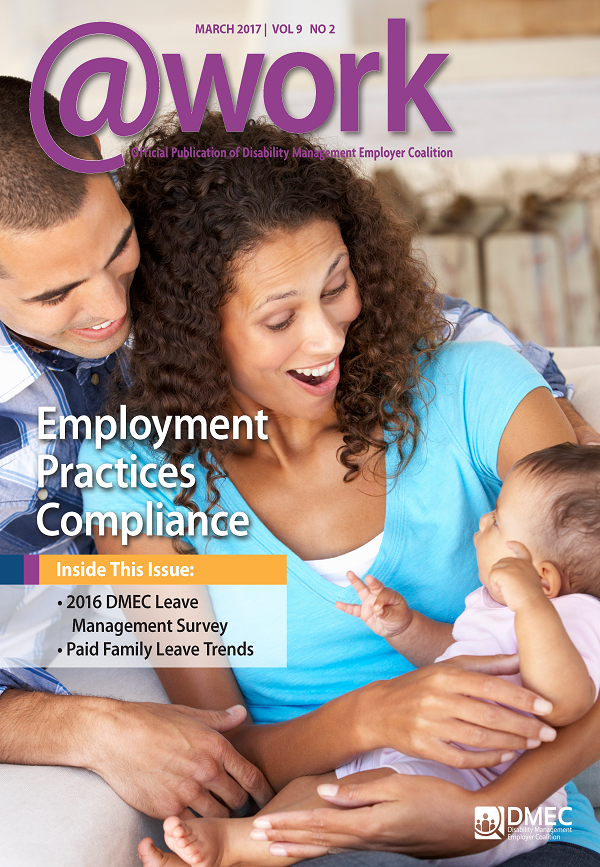
March 2017
Employment Practices Compliance
This edition of @Work magazine covers the rapidly evolving landscape of absence management compliance, and how employers can ensure their programs are meeting the new requirements.
Features
Defining Trends, Valuable Resources: 2016 DMEC Employer Leave Management Survey
Participation in the 2016 DMEC Leave Management Survey jumped 18% to 1,132 respondents, highlighting the growing importance of this compliance area for employers. The survey white paper, the sixth in the annual series, identifies continuing or changing employer leave management trends in 28 areas. Read more.

Expanding the National Discussion: Federal Paid Family Leave
Interest in paid family leave is strong and growing. While there are few indicators that federal legislation will harmonize paid family leave benefits in 2017, state laws and corporate leadership are driving change in the near term. Read more.

Spotlight Articles
Program Showcase: Injury Counselor for RTW
Safety and injury prevention are the first steps in any solid workers’ compensation program. But what happens when an injury occurs? Is there a way to get ahead of a claim before problems develop? Many employers overlook, undervalue, or interact poorly with the most critical element in the process — the employee. Read more.

RTW Case Study:
Compassionate Communications
When managing an employee’s disability, it’s important to treat the employee with respect and compassion and to consider the impact a disability can have on an employee’s life. Employees are human beings who may have concerns and challenges while on disability. Read more.

RTW Makeover: Mental Health Comorbidities
You’ve no doubt heard that “the whole is greater than the sum of its parts.” That’s because the parts don’t just add up, they interact. This concept applies across many phenomena; however, when it comes to disability, we often miss the importance of interaction. Read more.

Columns
Wrestling with ADA, FMLA, and Overtime: “No-Overtime” Leaves
An employee may be entitled to take FMLA time off to avoid mandatory overtime. This can occur when (1) a health condition flares up for which the employee has an approved FMLA intermittent leave or (2) the employee’s provider certifies that avoiding overtime will help the employee manage flare-ups. Read more.

Integrated Absence Management: State and Federal Employment Laws
Workplace injuries often trigger state workers’ compensation laws. However, on-the-job injuries may also trigger employee protections under the FMLA and ADA. Employers need to know the purpose and protections under each law, and when each law is triggered. Read more.

Ask the Accommodation Experts: Re-setting Employee Expectations
Jenny Haykin, MA, CRC, and Tom Sproger, MS, CEAS-II, discuss the topic of re-setting employee expectations, specifically around telecommuting requests, when healthcare providers provide accommodation recommendations rather than restrictions. Read more.

Absence Matters: Compliance Programs
The EEOC’s recently released Strategic Enforcement Plan narrows its focus to issues related to qualification standards and inflexible leave policies. The DOL has focused more of its resources on enforcing compliance with the FMLA through employer audits. How can you be prepared? Read more.

Untangling the ADA, FMLA, WC Web: Workplace Policies
On May 9, 2016, the EEOC issued a resource guide consolidating much of its existing advice on the ADA and employer-provided leave. In this guidance, the EEOC explores, among other issues, what has long been a central tenet of the ADA: flexible attendance and leave policies. Read more.

Overcoming the Disability Epidemic: Behavioral Job Duties
“Job demands” are a critical but often overlooked aspect of managing compliance under leave laws and the ADAAA. In sedentary and knowledge-based workforces, it is especially critical to understand behavioral demands — cognitive, emotional, and social. Read more.

The Future of Leave Management: Consumerization Trends – Part 2
The first column in this series demonstrated how the employee experience is driving the consumerization of leave management through emerging technologies. This second installment of the three-part series highlights three emerging consumer-oriented trends in the administration of statutory leave compliance. Read more.

Piecing Together the Integration Puzzle: Compliance Pitfalls
What steps do you need to take when an employee appears to be excessively using intermittent leave under the FMLA? Timely processes can ensure there are no delays and no suggestion that FMLA can be used indiscriminately. Read more.

Departments
The CEO’s Desk: Your Contribution. Your DMEC.
Your participation with DMEC helped produce three important, just-published resources that take the pulse of and report on key industry trends. The insight and passion shared encourages us about the future of our profession and also points us towards areas of challenge that DMEC can work towards providing assistance and resources to solve. Read more.

DMEC News: March 2017
The March 2017 DMEC News highlights new National sponsors, Executive Advisory Council members, and local chapter presidents. It also provides an introduction to new DMEC Education Programs Manager, Pam Bogner. Read more.

Compliance Memos: March 2017
The March 2017 compliance memos cover failure to provide FMLA notice and interference claims, honest belief and retaliation, state and local law updates, and Affordable Care Act updates. Read more.




